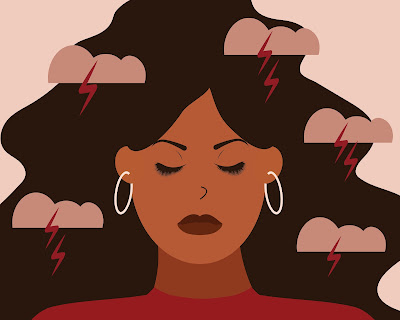Experiencing occasional anxiety is common. At any given time at least 30% of people experience anxiety. In this article, I'm focusing on self help tips you can use for anxiety relief (see my articles: What is the Difference Between Fear and Anxiety? , Coping with Anticipatory Anxiety and Tips to Cope With Chronic Worrying).
 |
| Coping With Anxiety |
Common Symptoms of Anxiety
Let's start by defining some of the symptoms of anxiety:
- Feeling nervous, restless or tense
- Having a sense of impending danger, panic or doom
- Having problems concentrating on anything other than your present worry
- Wanting to avoid anything that triggers your worry
- Having an increased heart rate
- Having problems sleeping (either falling or staying asleep)
- Trembling
- Sweating
- Breathing rapidly (hyperventilation)
- Having gastrointestinal (GI) problems
Common Forms of Anxiety
Here are some common forms of anxiety:
- Generalized Anxiety
- Panic Attacks (see my article: Tips on Coping With Panic Attacks)
- Posttraumatic Stress Disorder (see my article: Reacting to the Present Based on Your Past and Experiential Therapy, Like EMDR, Can Achieve Emotional Breakthroughs)
- Social Anxiety (see my article: Overcoming Social Anxiety)
- Adult Separation Anxiety (see my article: Overcoming Adult Separation Anxiety)
- Agoraphobia
- Phobias (see my article:What Are Phobias?)
Self Help Tips For Coping With Anxiety
If you experience occasional anxiety, which isn't causing significant problems in your life, here are some self help tips.
- Start Your Day With a Sense of Well Being: How you start your day can set the tone for the rest of your day and make a big difference in how you feel (see my article: Tips For Starting Your Morning With a Sense of Well Being and The Power of Creating Personal Rituals).
- Keep Physically Active: Whether you walk, dance, work out at the gym or engage in other healthy physical activity, keeping physical can be a powerful stress reliever. Develop a physical routine for yourself that takes into account your ability to be active in a healthy way. Consult with your doctor before making any significant changes to your physical activity.
- Use Stress Management and Relaxation Techniques: Meditation, visualization, yoga and other forms of stress management can help reduce anxiety (see my articles: Stress Management: Finding Moments of Peace and Relaxation, Stress Management and Self Care, Mindfulness Meditation, Safe Place Meditation and Creating Quiet Times For Yourself).
- Remember to Breathe: When you're anxious, you might breathe in a shallow way, which can increase anxiety. So you could benefit from being aware of your breathing and using relaxing breathing techniques (see my article: Square Breathing).
- Make Sleep a Priority: Most people need 7-8 hours of sleep per night (see my articles: Tips For Better Sleep and Conquering Your Nightmares).
- Spend Time in Nature: Spending time in green places can help relieve stress and anxiety (see my article: Walking in Nature Can Improve Your Mood).
- Eat a Balanced Diet: A balanced diet incorporates fruits, vegetables, whole grains and proteins. Always consult with your doctor before changing your diet.
- Reduce or Avoid Alcohol: The stimulative effect of alcohol can increase anxiety, so be aware of how much you're drinking (see my articles: Overcoming the Temptation to Use "Liquid Courage" to Cope With Social Situations).
- Avoid Recreational Drugs: Certain recreational drugs can increase anxiety, including cannabis.
- Cut Back or Eliminate Caffeinated Beverages: Caffeine can make anxiety worse, so be aware of your caffeine intake and take steps to either reduce or eliminate caffeinated beverages.
- Quit Smoking: Nicotine can make anxiety worse so take steps to stop smoking (see my article: Becoming a Successful Nonsmoker)
- Keep a Journal: Keeping a personal journal can help you to become aware of what's causing you anxiety and what helps to reduce your anxiety (see my article: Journal Writing Can Reduce Stress and Anxiety).
- Identify Your Triggers: Along with keeping a journal, being able to identify your triggers can help you to deal with your anxiety (see my article: Coping With Triggers).
- Get Emotional Support: Instead of isolating, stay social and get emotional support from trusted friends, family and a significant other (see my article: Overcoming Your Discomfort With Asking For Emotional Support).
When Self Help Isn't Enough
The suggestions above can help to reduce anxiety, but when you're experiencing persistent anxiety self help might not be enough.
In my next article, I'll discuss how psychotherapy can help you to overcome anxiety (see my article: Getting Help in Therapy For Anxiety).
Getting Help in Therapy
Anxiety can reduce the quality of your life and overall sense of well-being.
If anxiety is a persistent problem, seek help from a licensed mental health professional.
Getting help in psychotherapy for your anxiety can improve the quality of life for you and for your loved ones who might be affected by your anxiety, so don't hesitate to seek help (see my article: Your Anxiety or Depression Could Be Having a Negative Impact on Your Loved Ones).
About Me
I am a licensed New York City psychotherapist, hypnotherapist, EMDR, AEDP, EFT and Somatic Experiencing therapist.
I work with individual adults and couples.
I have helped many clients to overcome persistent anxiety.
To find out more about me, visit my website: Josephine Ferraro, LCSW - NYC Psychotherapist.
To set up a consultation, call me at (917) 742-2624 during business hours or email me.







.jpg)












